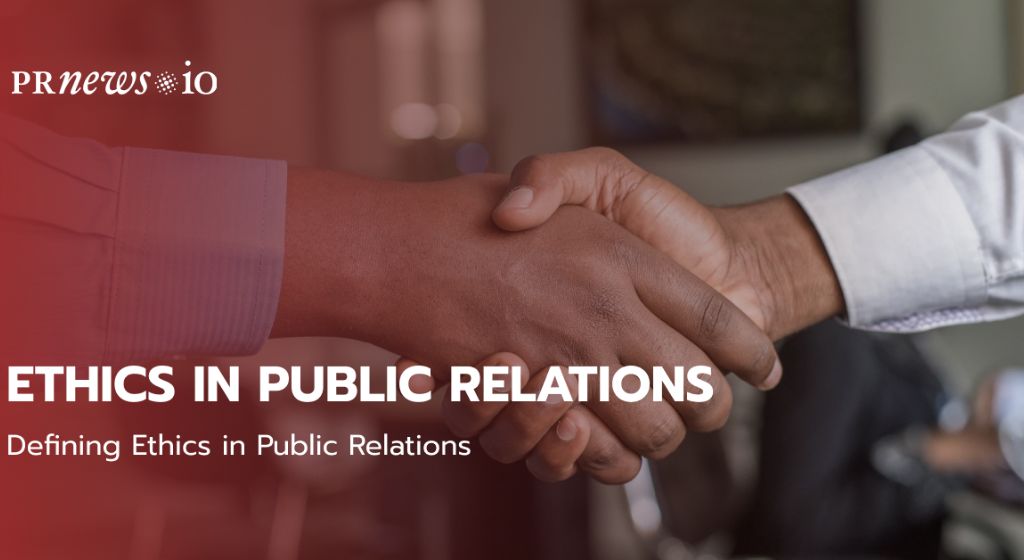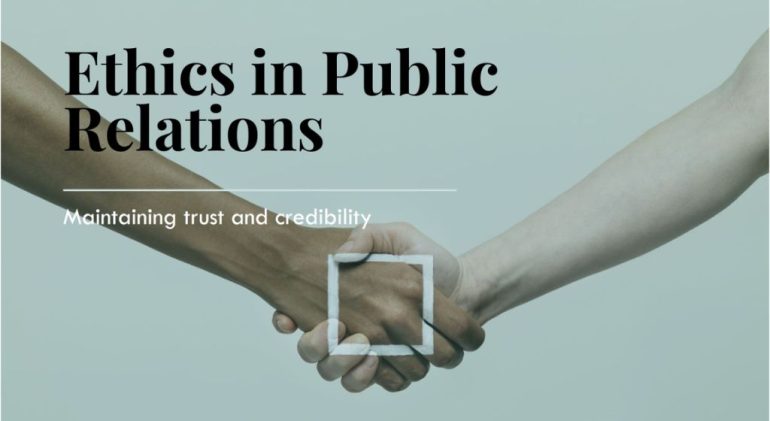Public relations (PR) plays a powerful role in shaping public opinion, influencing societal discourse, and building reputations. With that power comes a significant ethical responsibility.
PR professionals are not just messengers; they are storytellers, gatekeepers, and strategists. What they say, how they say it, and whom they say it to can affect industries, governments, communities, and individuals. Ethical PR practice means maintaining honesty, transparency, fairness, and respect — even under pressure from clients, executives, or public scrutiny.
The Fine Line Between Persuasion and Manipulation
PR is, at its core, persuasive communication. But when persuasion crosses the line into manipulation, ethical concerns emerge. Ethical PR seeks to inform and engage, not deceive or mislead.
The difference often lies in intent and execution. Presenting facts in a way that supports a brand’s image is acceptable; hiding negative truths or spinning falsehoods is not.
For instance, highlighting a company’s environmental initiatives while ignoring harmful practices (a tactic known as “greenwashing”) may achieve short-term positive press, but it risks long-term reputational damage if exposed.
Professionals must ask themselves: Are we giving the public the full picture? Are we using data selectively to deceive rather than clarify? Ethical PR always prioritizes truthfulness, even when the full truth is inconvenient.
Transparency Builds Trust
In a media landscape shaped by misinformation and skepticism, transparency has become a pillar of ethical public relations. Audiences now demand openness — they want to know who’s funding content, what the motives are, and whether claims can be trusted.
PR teams must clearly disclose sponsored content, partnerships, and affiliations. Hidden agendas or lack of attribution can lead to a backlash that not only damages credibility but also fuels public distrust in media as a whole.
Transparency is also critical in crisis communications. Attempts to cover up scandals, delay statements, or deny wrongdoing usually make matters worse. Brands that own up to mistakes, communicate openly, and take responsibility tend to recover faster and retain public goodwill. In PR, transparency isn’t just ethical — it’s strategic.
The Challenge of Representing “Unethical” Clients
One of the most complex ethical questions in PR arises when practitioners are asked to represent clients or causes they personally disagree with or that are widely viewed as controversial.
This could include industries such as tobacco, oil, fast fashion, or political regimes. While some PR firms adopt a “no judgment” approach — treating every client as a business transaction — others establish internal guidelines about which clients they will or will not serve.
The PRSA (Public Relations Society of America) Code of Ethics encourages practitioners to act in the public interest and avoid deceptive practices.
This means PR professionals must evaluate whether their work helps advance misleading narratives, cover up harmful practices, or contradict their own values. In difficult cases, saying no to a lucrative contract may be the more ethical — and reputationally sound — choice.

Ethics in Influencer and Social Media Campaigns
As influencer marketing and social media campaigns have become central to PR strategy, new ethical questions have emerged. Should influencers be required to disclose paid partnerships?
Is it ethical for brands to pay for positive reviews or ask creators to avoid mentioning competitors? How do you maintain authenticity in a space driven by aesthetics, performance, and virality?
Ethical PR insists on full disclosure. The U.S. Federal Trade Commission (FTC) requires influencers to clearly label sponsored content. Yet many posts still blur the lines between organic endorsements and paid promotion.
PR teams must take responsibility for educating their clients and influencer partners on proper disclosure practices. Moreover, the pressure to go viral should never justify unethical behavior — such as staging fake controversies, using clickbait, or promoting misleading statistics.
Respect for Stakeholders and Audiences
Ethical PR respects not only clients but also the broader set of stakeholders affected by a campaign — employees, customers, investors, media partners, and the public. This means avoiding harmful stereotypes, protecting consumer data, and ensuring that communications don’t incite panic, discrimination, or harm.
For example, crisis messaging during a health emergency must prioritize public safety over corporate image. Similarly, campaigns that target marginalized groups should avoid exploitative or tokenistic messaging and instead be rooted in cultural sensitivity and community engagement.
PR professionals also have a duty to respect journalists, editors, and content creators. This includes honoring embargoes, not spamming inboxes with irrelevant pitches, and providing truthful, helpful information when requested. PR is a two-way relationship, and respect is fundamental to maintaining it.
Ethics in Data Use and AI Tools
As PR teams increasingly rely on analytics, sentiment tracking, and AI-driven tools for media monitoring, personalization, and message testing, new ethical considerations come into play.
Is it ethical to scrape public social media posts for insights without consent? Should AI-generated press releases be disclosed as non-human content? Can predictive analytics cross privacy boundaries?
The rapid evolution of digital tools demands a new layer of ethical awareness. PR professionals must be transparent about how they collect and use data, ensure consent where necessary, and respect privacy. Using AI should not replace human judgment, particularly when crafting messages that deal with sensitive topics or have the potential to misinform.
Navigating Conflicts of Interest
Conflicts of interest can threaten the ethical foundation of PR work. Whether it’s representing competing clients, taking payment for favorable coverage, or failing to disclose vested interests, these situations must be handled with care. The best approach is to be upfront about potential conflicts and work to avoid any situations where loyalties may be compromised.
Agencies and professionals should have conflict policies in place and be willing to walk away from work that could harm their integrity. Ethics must always take precedence over short-term gains. When transparency is lacking, trust quickly erodes.
Upholding Professional Standards
To maintain public trust and ensure credibility in the industry, PR professionals must commit to continuous ethical learning. This includes familiarizing themselves with established codes of conduct, such as those from the PRSA, CIPR (Chartered Institute of Public Relations), or IPRA (International Public Relations Association). These guidelines provide a framework for decision-making in complex or ambiguous situations.
Organizations should also promote a culture of ethics internally, offering training, encouraging open discussion of ethical dilemmas, and rewarding integrity as much as results. Ethical PR is not just the responsibility of individuals — it must be supported by leadership and embedded in company culture.

